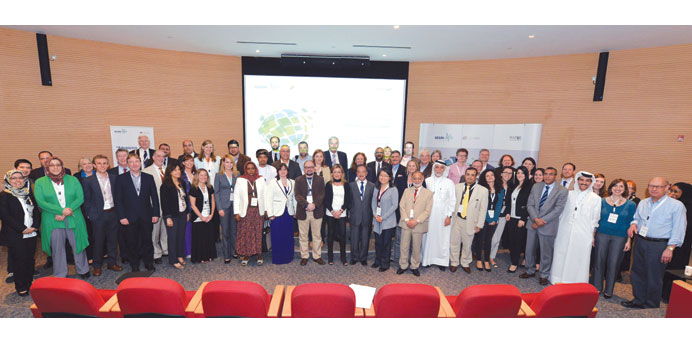Qatari women and their evolving roles in personal and public domains were the subject of two of a strong slate of seven papers that Northwestern University in Qatar (NU-Q) presented at the World Association for Public Opinion Research (Wapor) regional conference held at Qatar
University (QU).
The paper, “Great Expectations: Women, Education and Marriage in Qatar”, presented by NU-Q’s Mohana Rajakumar, won the Early Researcher Award at the conference along with co-author Tanya Kane, both NU-Q adjunct lecturers, and undergraduate research assistant
Jessica Hammam.
The paper outlined how the current generation of Qatari females, many of whom are attending university and preparing for professional fields, are still expected to fulfil traditional gender roles as wives and mothers, and within the same timeframe as their own mothers or grandmothers.
Qatari women were likewise the subject that kicked off an all-NU-Q panel at a session, chaired by NU-Q associate dean of research Klaus Schoenbach.
Christina Paschyn and Kirsten Pike from NU-Q presented the first results of a study showing that majalis al-hareem (women’s gatherings) can function as sites of political and social engagement for Qatari women. The study found that 86% of Qatari women participate in majalis, and the type of majalis - neighbourhood, family, religious or social - is strongly correlated with different levels and attitudes of civic engagement.
“This is eye-opening research,” said Dr Darwish al-Emadi, director of the Social and Economic Survey Research Institute (Sesri), Qatar University, which organised the Wapor conference. “People often speak about the male majalis, but the focus on women’s majalis is original, and we at Sesri are thrilled to be facilitating this study.”
The paper is part of a larger collaborative study conducted by NU-Q researchers Jocelyn Sage Mitchell, Kane, Paschyn and Pike, as well as Justin J Gengler of Sesri and Sadia Mir of VCUQatar, funded by a grant from the Qatar National
Research Fund.
“NU-Q’s presentations at the conference covered a breadth of topics, including entertainment use in the Middle East, methodological approaches to public opinion research, a qualitative comparison of cultural differences in media coverage and the role of social media,” said Everette E Dennis, dean and CEO of NU-Q.
NU-Q researchers presented a total of seven papers at the
conference.
In addition to those presented by Rajakumar and Paschyn, NU-Q made the following contributions to the Wapor conference: “Desire for cultural preservation and attitudes toward entertainment censorship in the Arab Gulf: Qatar, Saudi Arabia and the UAE”, presented by Justin Martin; “Labour rights in Qatar: Contrasting the input for the public sphere in three world regions”, presented by Elizabeth Lance; “Redefining survey research: Uncovering the truth”, presented by Ilhem Allagui; “Understanding Within-Group DIF in Survey Response: Evidence from Three Surveys in Qatar”, presented by Sage Mitchell; and “Social media as the source of an alternative public sphere”, presented by Susan Dun.

Some of the participants of the Wapor regional conference at NU-Q.
